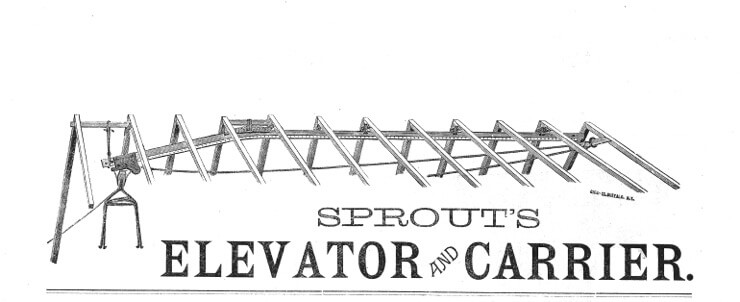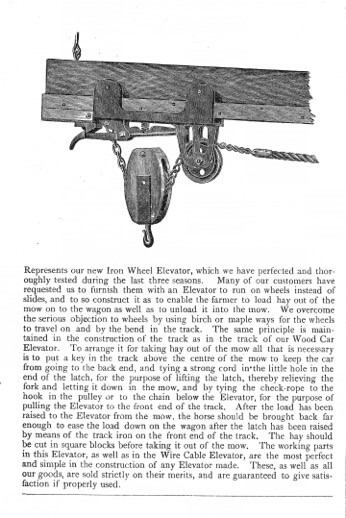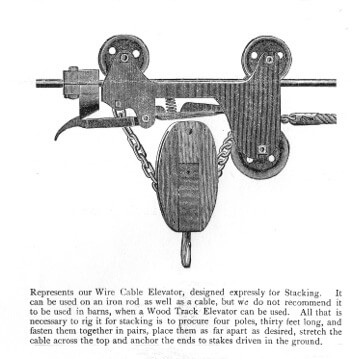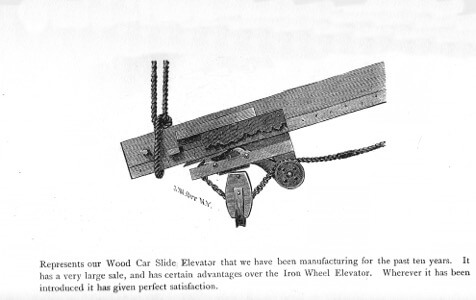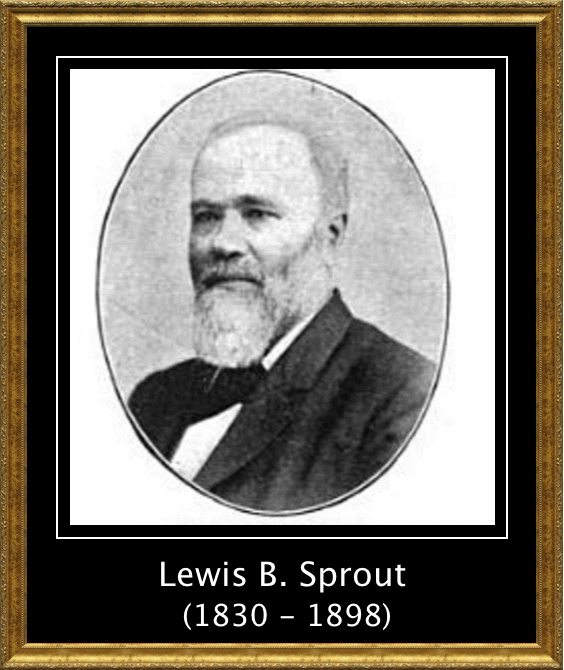
Headquarters:
Muncy, PennsylvaniaAlso sold under the names (if applicable):
History:
Lewis B. Sprout (1830 – 1898)
Born in Montrose, Pa., May 4, 1830, Lewis B. Sprout was descended from a sturdy Scotsman who settled in Massachusetts soon after the landing of the Pilgrims, and was the youngest among the eleven children of Ebenezer and Miriam Burrows Sprout, who migrated from New England into Pennsylvania soon after their marriage and settled finally in Lycoming county. Lewis had preceded them in 1854, coming to the village of Picture Rocks and taking charge for several years of the sash, blind, and door factory which a brother, A. Rennselaer Sprout, and their uncle, Amos Burrows had their established. In 1866 Lewis and another brother, Samuel E., began in Muncy the manufacture of the Sprout horse hay fork, an invention of still another brother, Ariel B. Sprout. Several years later Lewis bought out his partner, and in 1880 he sold the plant and business to John Waldron, his son-in-law. In 1883 the late Charles H. Sprout, a son of Lewis, was admitted to partnership in the business under the firm name Waldron & Sprout. A large factory was at once erected, only to be destroyed by fire in 1888. It was replaced by one still larger and new lines of manufacture added, so that when, in 1892, a new co-partnership including John Waldron, Lewis B. and Charles H. Sprout was formed, we find the concern doing a prosperous and growing business in french burr feed mills, wheat and buckwheat flour mills,and other specialties, upon which they hold a number of patents. The death in March, 1896 of Charles H. Sprout, who was stricken with appendicitis while on a business trip, and died in hospital away from home, was a severe loss to the firm, and particularly to Lewis, who had found in his son a talented and able co-worker in their expanding business and one on whom he could confidently rely for support and counsel in his old age. Indeed it is believed that the prostration due to that bereavement was the direct cause of his death. 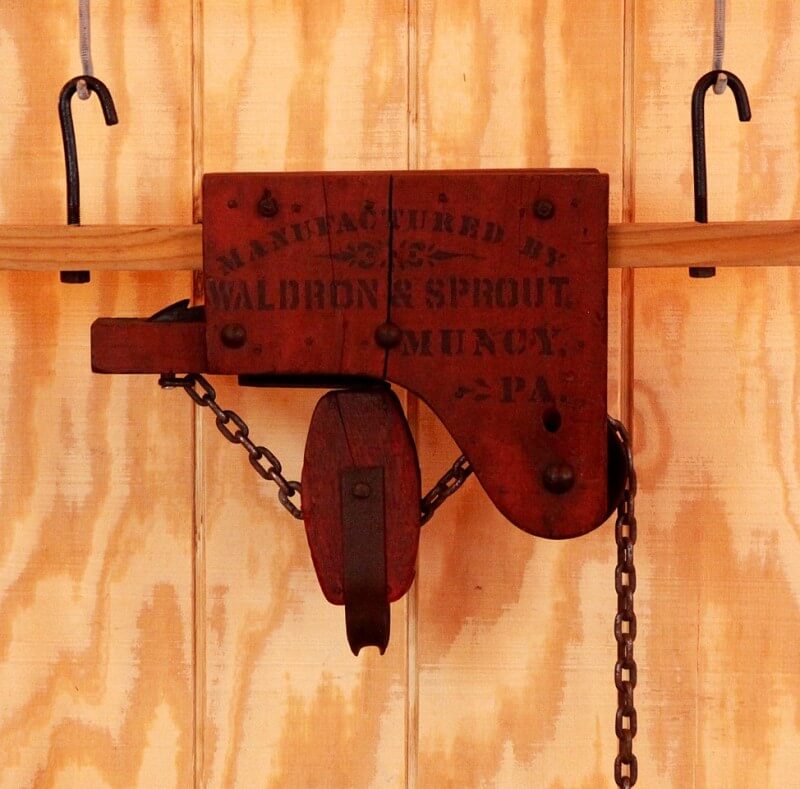 Mr. Sprout married in 1855 Ellen Donnelley, and to them were born six children, of whom three – Mrs. Maggie Waldron, Mrs Lucilla Sears, and Fred. M., who succeeded Charles as a director in the firm – are now living. The burial took place June 13 and was very largely attended, the employees being present in a body. The pall bearers were six nephews of the dead – Edgar Sprout of Muncy, Judson and Clarence E. Sprout of Williamsport, Henry Sprout of Hughesville, Willis Sprout of Galeton, and Gordon Sprout of Picture Rocks. Though well honorably known to millers throughout a large section of the country, Lewis B. Sprout will perhaps be most widely remembered for the leading part he bore in the bitter but successful fight against the Brua patent interests. His name will always be associated with that memorable struggle.
Mr. Sprout married in 1855 Ellen Donnelley, and to them were born six children, of whom three – Mrs. Maggie Waldron, Mrs Lucilla Sears, and Fred. M., who succeeded Charles as a director in the firm – are now living. The burial took place June 13 and was very largely attended, the employees being present in a body. The pall bearers were six nephews of the dead – Edgar Sprout of Muncy, Judson and Clarence E. Sprout of Williamsport, Henry Sprout of Hughesville, Willis Sprout of Galeton, and Gordon Sprout of Picture Rocks. Though well honorably known to millers throughout a large section of the country, Lewis B. Sprout will perhaps be most widely remembered for the leading part he bore in the bitter but successful fight against the Brua patent interests. His name will always be associated with that memorable struggle.
Source: The Roller Mill Volume 16 (June 1898), By Charles S. Parke, Augustine B. Kellogg
JOHN WALDRON (1844 – 1902)
John Waldron, deceased, was during his early manhood a splendid type of the citizen soldiery of the nation which consecrated its effort to the preservation of the Union, and, at the close of the gigantic struggle, turned gladly away from scenes of carnage and glory to engage in the arts of peace, to the betterment of the land and of all their fellows. Mr. Waldron was born in Moreland township, Lycoming county, Pennsylvania, January 23, 1844. He was educated in his native township, and at the age of eighteen years, when just prepared to enter upon an active career, was turned aside by the call of President Lincoln for troops to enforce the national authority. He was at that age when patriotic spirit ran high, and on August 14, 1862, he enlisted in Company G, One Hundred and Thirty-first Regiment Pennsylvania Volunteers. He bore himself with soldierly ability in the stirring campaigns of the Army of the Potomac, marked by many desperate battles, until that at Fredericksburg, Virginia, December 13, of the same year, where he was wounded in the hip. He was discharged for disability resultant from this wound, May 23, 1863. Having recovered, he re-enlisted in January, 1864, in Company C, One Hundred and Eighty-seventh Regiment, Pennsylvania Volunteers, and participated in the ensuing great campaigns under General Grant until in the operations in front of Petersburg, Virginia, he suffered the loss of his left arm, June 18, 1864. He was long invalided on this account, but even this was not sufficient to dampen his patriotic ardor, and on recovering, though incapacitated for field service, he sough to yet serve his country, and took a position in the quartermaster’s department, February 5, 1865, and continued therein until June 20 of the same year, when the collapse of the rebellion ended the necessity for his services.
Soon after leaving the employ of the government Mr. Waldron went to Missouri, where he labored upon a farm for two years, and then attended a commercial college in St. Louis, where he paid special attention to telegraphy. In 1875 he returned to Pennsylvania and accepted a position as a telegraph operator at Montgomery, and was subsequently advanced to that of station master, and served as such until 1880, when he resigned and located in Muncy, at once becoming identified with the industrial interests of that place. Purchasing the manufacturing business of his father-in-law, the late Lewis B. Sprout, he continued the manufacture of hay forks, elevators and other hay machinery, until 1884, when he associated with himself his brother-in-law, Charles H. Sprout, and began the manufacture of flour milling machinery. In 1895 the firm was incorporated under the name of Sprout, Waldron & Company, Mr. Waldron becoming president, and continuing in that position until his death. He was a prime factor in making the company what it is today, among the most extensive manufacturers in its line in the United States, its products being in demand in all parts of this country, and in many foreign countries.  Nor was the great success of the enterprise achieved without struggles and discouragements. Twice were the factories burned down : On February 22, 1888, and on February 7, 1900, but were each time rebuilt, and upon a larger scale, and long before his death it was the great satisfaction of Mr. Waldron to witness the possession of an entirely modern plant, equipped with all that could be of advantage, a well systematized management, and an output of product of such superior quality that at the Louisiana Exposition the Sprout, Waldron & Company factories were awarded the highest award for one of their specialties, grinding mills. He also witnessed important changes in the personnel of the management : The death of Lewis B. Sprout, the treasurer; and of Charles H. Sprout, the secretary-the first named place being succeeded to by Stephen Soars, at the dying request of his father-in-law, Lewis B. Sprout; and the latter by J. Russell Smith, a young man who as bookkeeper and assistant to the elder Sprout had shown himself worthy of trust and deserving of advancement. In 1899 an addition was made to the official staff by the election of N. L. Vredenburg, an accomplished miller, to the newly created place of vice-president. And so the great factories stand as enduring monuments to their founder and those who had them in charge in their earlier years, and of their successors it is said : “Forgetting the past, except as they learn its rich lessons of experience, they face the new century full of faith in themselves and their ability to serve those whose confidence they have been proud to win, and whose future favors they shall endeavor to merit.”
Nor was the great success of the enterprise achieved without struggles and discouragements. Twice were the factories burned down : On February 22, 1888, and on February 7, 1900, but were each time rebuilt, and upon a larger scale, and long before his death it was the great satisfaction of Mr. Waldron to witness the possession of an entirely modern plant, equipped with all that could be of advantage, a well systematized management, and an output of product of such superior quality that at the Louisiana Exposition the Sprout, Waldron & Company factories were awarded the highest award for one of their specialties, grinding mills. He also witnessed important changes in the personnel of the management : The death of Lewis B. Sprout, the treasurer; and of Charles H. Sprout, the secretary-the first named place being succeeded to by Stephen Soars, at the dying request of his father-in-law, Lewis B. Sprout; and the latter by J. Russell Smith, a young man who as bookkeeper and assistant to the elder Sprout had shown himself worthy of trust and deserving of advancement. In 1899 an addition was made to the official staff by the election of N. L. Vredenburg, an accomplished miller, to the newly created place of vice-president. And so the great factories stand as enduring monuments to their founder and those who had them in charge in their earlier years, and of their successors it is said : “Forgetting the past, except as they learn its rich lessons of experience, they face the new century full of faith in themselves and their ability to serve those whose confidence they have been proud to win, and whose future favors they shall endeavor to merit.”
Mr. Waldron was an impressive personality. Of splendid physique, his fine frank open countenance, ever beaming with good nature, was a benediction upon every one who gazed into it, while his empty sleeve was a pathetic reminder of his self-sacrificing patriotism. He entered largely into the life of the community, bearing a full measure of the labors of promoting every worthy and needy cause, and of aiding the unfortunate. He was an attendant at the services of the Baptist church, and a liberal contributor to its support and that of its various benevolences. His political affiliations were with the Republican party. He was prominent and widely known in Grand Army circles, an active member of John D. Musser Post, No. 66, in which he had held the position of commander for several years, also those of chaplain, adjutant, senior vice-commander, and quartermaster-sergeant, in which latter station he was serving at the time of his death. He was also a charter member of the Royal Arcanum.
 December 9, 1875, Mr. Waldron married Miss Maggie Sprout, a daughter of Lewis B. Sprout, and to them were born four sons and one daughter-Charles M., W. Harris, J. Howard, Fred S., and Amelia, who are all living; and five children who died in infancy.
December 9, 1875, Mr. Waldron married Miss Maggie Sprout, a daughter of Lewis B. Sprout, and to them were born four sons and one daughter-Charles M., W. Harris, J. Howard, Fred S., and Amelia, who are all living; and five children who died in infancy.
Mr. Waldron died on August 4, 1902, at his home in Muncy, after an illness of several months, in the fifty-ninth year of his age, and the sad event came as a personal bereavement to countless members of the community, who honored him for his usefulness and held him in affection for his excellence of personal character. The funeral services were held in the Baptist church, the same sacred edifice where were held those over the remains of the father-in-law and brother-in-law of the lamented deceased, and the same clergymen officiating. The employees of Sprout, Waldron & Company attended in a body, and there were also present large delegations from the Royal Arcanum and Musser Post, G. A. R., the active pallbearers being from that last named, headed by Comrade Samuel B. Sprout. Interment was made in the Muncy cemetery, in the family burying plot, already hallowed by the silent presence of the loved ones gone before.
Source: Genealogical and Personal History of Lycoming County, John W. Jordan, Lewis Historical Publishing Co., 1906.
